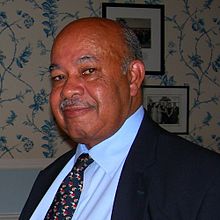Michigan Civil Rights Initiative
[4] Judges R. Guy Cole Jr. and Martha Craig Daughtrey said that "Proposal 2 reorders the political process in Michigan to place special burdens on minority interests."
[6] On November 16, 2012, the Sixth Circuit Court of Appeals, sitting en banc, upheld the earlier ruling that the MCRI was unconstitutional.
[7] The Supreme Court of the United States granted certiorari in Schuette v. Coalition to Defend Affirmative Action on March 25, 2013.
In 2004, When the first attempt was made to place the measure on the ballot, Gregory Creswell was MCRI spokesperson, volunteer coordinator, and an organizer.
[14] During the early debate about the proposal shortly following the collection of signatures (508,282 submitted January 6, 2005), the Michigan Civil Rights Commission, a governmental body charged with investigating civil rights violations in the state of Michigan, concluded an investigation of MCRI and asserted that supporters of the MCRI had committed widespread and systematic racially targeted fraud in their petition campaign to secure ballot access.
The case was heard by U.S. District Court Judge Arthur Tarnow, who promised to rule on the matter by September 8, 2006, to give officials enough time to print up the ballot.
[23] On August 29, 2006, the case was decided with Judge Tarnow, a Democratic judicial appointee, refusing to remove the initiative from the ballot.
He ruled that the Voting Rights Act was not violated because it "is not a general anti-voter fraud statute, but rather prohibits practices which result in unequal access to the political process because of race."
Counter-allegations were made by MCRI supporters that the allegations were fabricated and that the Board of Canvassers' decision-process itself was being improperly influenced by politics because Michigan Democratic Party Chairman Mark Brewer was "giving orders" to the two members of the Board appointed by Democrats, and backed up by the linked videotape shot by MCRI Treasurer and publisher Chetly Zarko.
We say hell no!," the emotion-surged crowd of students continued until a table was overturned in the commotion and the Lansing police came in to control the situation.
Opponents of MCRI labeled their own conduct civil disobedience while proponents argued it crossed the line into outright violence and intentional intimidation.
Proponents of the MCRI claim that the initiative will make illegal only those programs and policies, affecting university admissions, public employment, and contracting, that grant "preferential treatment" based on gender, race, or ethnicity.
They point to programs such as California's use of socio-economic indicators, outreach targeted at the 150 lowest scoring high schools, and traditional anti-discrimination enforcement as some among many race-neutral types of "affirmative action".
Two weeks later, on November 21, Grand Rapids Mayor George Heartwell said he was considering having the city file a federal lawsuit to overturn Proposal 2.
The Center for Individual Rights has asked the U.S. Sixth Circuit Court of Appeals to overturn Judge Lawson's ruling and force the universities to adhere to this amendment, to the Michigan Constitution, immediately.
[37] In Detroit, Matt Allen, a spokesman for Mayor Kwame Kilpatrick said the city illegally "will continue doing business as it has been" in spite of the passage of the statewide initiative.
[39] On January 4, 2007, the Center for Individual Rights filed a lawsuit in Washtenaw Circuit Court, asking a judge to order the University of Michigan to immediately comply with Proposal 2, and abandon their affirmative action programs.
[citation needed] On Thursday, February 15, BAMN submitted 2,000 petitions to the Board of Regents of the University of Michigan demanding that there be no drop in minority enrollment.
Attorney General Bill Schuette then announced that he would appeal the ruling and ask to have the case re-heard "en banc," by all active judges rather than a panel of three.
The brief authors argue that Proposal 2 violates the Equal Protection Clause of the 14th Amendment of the Constitution by creating procedural barriers for people of color.
[citation needed] On 16 November 2012, the Sixth Circuit Court of Appeals sitting en banc upheld the earlier ruling that the Initiative is unconstitutional.
[citation needed] A spokeswoman for the university, Julie Peterson, has said that since the numbers aren't final and since so many minority students applied early, the drop cannot necessarily be attributed to the amendment itself.

